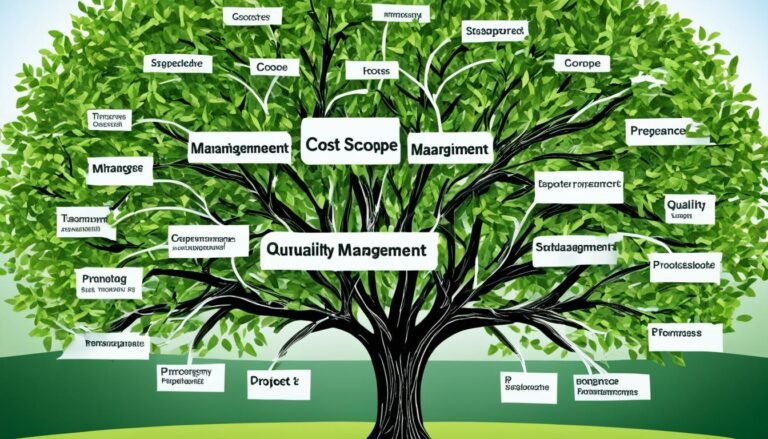Conflict Resolution in Project Management: Techniques and Strategies
|
Getting your Trinity Audio player ready...
|
Conflict is an inevitable part of project management, as diverse teams with different perspectives and goals come together to achieve a common objective. As a project manager, it is essential to possess effective conflict resolution techniques and strategies to ensure the smooth progression of the project.
This discussion aims to explore various approaches to conflict resolution, including understanding conflict types, employing effective communication techniques, utilizing collaborative problem-solving approaches, implementing negotiation and compromise strategies, recognizing the role of mediation, and establishing conflict resolution policies.
By delving into these techniques and strategies, project managers can navigate conflicts successfully and foster a productive and harmonious work environment.
Key Takeaways
- Conflict is inevitable in project management due to diverse stakeholders, varying interests, and limited resources.
- Effective communication techniques, such as active listening and paying attention to nonverbal cues, are crucial in resolving conflicts.
- Collaborative problem-solving approaches, such as the Win-Win approach and Consensus-Building approach, foster a work environment where team members work together towards solutions.
- Negotiation and compromise strategies, including active listening and generating multiple options, aim to achieve win-win outcomes and address the interests of both sides.
- Mediation plays a vital role in conflict resolution by facilitating impartial and structured communication between conflicting parties, employing techniques such as active listening, reframing, and shuttle diplomacy.
Understanding Conflict Types
Understanding Conflict Types is crucial in project management as it allows for a comprehensive analysis and effective resolution of conflicts that may arise during the project lifecycle. Conflict is inevitable in any project due to the diversity of stakeholders, varying interests, and limited resources. By understanding the different types of conflicts, project managers can better anticipate and address them, minimizing their negative impact on the project.
One important aspect of understanding conflict types is recognizing conflict escalation. Conflict escalation refers to the process by which conflicts intensify and become more difficult to resolve. It often starts with minor disagreements or misunderstandings and gradually escalates into more serious disputes. By identifying the signs of conflict escalation early on, project managers can take proactive measures to prevent further escalation and resolve the conflict before it causes significant damage to the project.
Another essential skill in understanding conflict types is conflict resolution. Conflict resolution skills enable project managers to effectively address conflicts and find mutually acceptable solutions. These skills involve active listening, effective communication, negotiation, and problem-solving. By employing these skills, project managers can foster open dialogue, encourage collaboration, and reach consensus among conflicting parties.
Effective Communication Techniques
To ensure successful conflict resolution in project management, implementing effective communication techniques is crucial.
Active listening is an essential skill that allows project managers to fully understand the concerns and needs of all parties involved in the conflict. By actively listening, project managers can demonstrate empathy and show that they value the opinions and perspectives of others. This helps to build trust and fosters an environment where open communication can flourish.
Additionally, nonverbal communication plays a significant role in effective communication. Body language, facial expressions, and tone of voice can convey emotions and attitudes that words alone cannot express. Project managers should pay attention to their own nonverbal cues and also be observant of others'. Being aware of nonverbal signals can help project managers identify underlying issues or emotions that may contribute to the conflict.
Collaborative Problem-Solving Approaches
Implementing collaborative problem-solving approaches is essential for successful conflict resolution in project management. In order to effectively address conflicts within a team, project managers need to understand team dynamics and possess strong conflict resolution skills. By fostering a collaborative problem-solving environment, project managers can encourage team members to work together towards finding mutually beneficial solutions.
One approach that can be used is the Win-Win approach, where the focus is on finding a solution that satisfies the needs and interests of all parties involved. This approach requires active listening, empathy, and a willingness to explore different perspectives.
Another approach is the Consensus-Building approach, which involves engaging the entire team in decision-making and problem-solving processes. This approach encourages open communication, brainstorming, and consensus-building, ensuring that all team members have a voice and are invested in the outcome.
Negotiation and Compromise Strategies
The effective use of negotiation and compromise strategies is crucial for resolving conflicts in project management. When conflicts arise, it is important to find win-win solutions that satisfy the needs and interests of all parties involved. Here are four negotiation and compromise strategies that can be employed to achieve this:
- Active listening:
Conflict resolution skills start with active listening. It involves giving full attention to the other person and seeking to understand their perspective. By listening actively, project managers can identify the underlying needs and concerns of each party, facilitating the development of mutually beneficial solutions.
- Identifying common ground:
Finding common ground is essential in negotiation and compromise. Project managers need to identify shared goals or interests among conflicting parties. By focusing on areas of agreement, they can build a foundation for reaching win-win solutions that address the needs of both sides.
- Generating multiple options:
It is important to brainstorm multiple options for resolving the conflict. By considering a variety of alternatives, project managers can increase the likelihood of finding creative solutions that satisfy the interests of all parties. This encourages collaboration and helps in moving towards a mutually beneficial outcome.
- Integrative negotiation:
Integrative negotiation involves seeking solutions that create value for all parties involved. Project managers can use this strategy to explore trade-offs and identify solutions that address the underlying concerns of each party. By emphasizing cooperation and collaboration, integrative negotiation can help in achieving win-win outcomes.
The Role of Mediation in Conflict Resolution
Mediation plays a crucial role in the resolution of conflicts in project management by facilitating impartial and structured communication between conflicting parties. Mediators are trained professionals who help parties in conflict reach a mutually acceptable resolution. They employ various mediation techniques and conflict resolution skills to guide the process effectively.
One widely used mediation technique is active listening, where the mediator listens attentively to each party's concerns and helps them understand each other's perspectives. This promotes empathy and enables the parties to find common ground. Another technique is reframing, where the mediator helps reframe the issues to focus on interests rather than positions, fostering a problem-solving approach.
Mediators also employ shuttle diplomacy, where they meet separately with each party to explore their underlying interests and concerns. This technique allows the mediator to gain a deeper understanding of the issues and find potential areas of agreement.
The following table provides an overview of mediation techniques and their benefits:
| Mediation Technique | Benefits |
|---|---|
| Active listening | Encourages empathy and understanding |
| Reframing | Promotes problem-solving approach |
| Shuttle diplomacy | Allows for deeper exploration of interests |
Implementing Conflict Resolution Policies
As organizations aim to foster a harmonious working environment, it becomes essential to establish effective policies for managing and resolving conflicts in project management. Implementing conflict resolution policies can help mitigate potential disputes and maintain a productive and collaborative atmosphere within the project team.
Here are four key steps to successfully implement conflict resolution policies:
- Develop a comprehensive conflict resolution process: Define a clear and structured process for addressing conflicts, including the steps involved, the roles and responsibilities of team members, and the timeline for resolution. This process should be communicated to all project stakeholders to ensure everyone understands how conflicts will be managed.
- Provide conflict resolution training: Offer training sessions or workshops to equip team members with the necessary skills and techniques to effectively manage conflicts. This training should cover active listening, communication strategies, negotiation tactics, and problem-solving techniques.
- Establish a neutral third-party mediator: Designate a neutral individual or team with expertise in conflict resolution to facilitate discussions and mediate conflicts when necessary. This mediator should be unbiased and possess excellent communication and problem-solving skills to help parties reach mutually satisfactory resolutions.
- Regularly review and update policies: Conflict resolution policies should be regularly evaluated and updated to reflect any changes in the project's dynamics or team composition. This ensures that the policies remain relevant and effective in managing conflicts as they arise.
Conclusion
In conclusion, conflict resolution is a crucial aspect of project management. By understanding the different types of conflict, employing effective communication techniques, and utilizing collaborative problem-solving approaches, project managers can successfully navigate conflicts within their teams.
Additionally, implementing negotiation and compromise strategies can further enhance the effectiveness of conflict resolution efforts. Mediation can also play a vital role in resolving conflicts and maintaining a harmonious work environment.
Furthermore, implementing conflict resolution policies can help to enhance the effectiveness of conflict resolution efforts. Statistics show that organizations that prioritize conflict resolution have a 50% higher project success rate, highlighting the importance of proactive conflict management.







